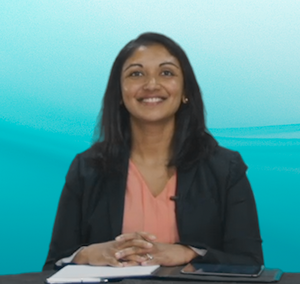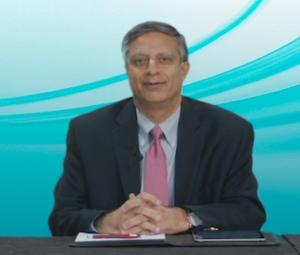Articles by Nisha Joseph, MD
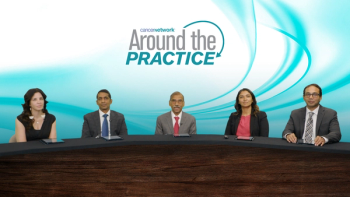
Looking Forward: Future Directions, Early-Line Trials, and the Prospect of Cure
BySundar Jagannath, MBBS,Ajay Nooka, MD, MPH, FACP,Mohan Krishnamachary, MD,Nisha Joseph, MD,Donna Catamero, MSN, ANP-BC, OCN, CBCN The final segment synthesizes the discussion and looks ahead to the future of BCMA bispecifics. Jagannath recaps the extraordinary strides made thus far, from strong response rates to improved safety management, and highlights the growing role of combinations with agents like daratumumab and the expansion into newly diagnosed and smoldering myeloma clinical trials.

Duration of Therapy and De-escalation: Navigating the Unknowns
BySundar Jagannath, MBBS,Ajay Nooka, MD, MPH, FACP,Mohan Krishnamachary, MD,Nisha Joseph, MD,Donna Catamero, MSN, ANP-BC, OCN, CBCN Here, the panel turns to one of the most debated questions surrounding bispecific antibodies: how long should patients remain on therapy? Jagannath raises a scenario involving a patient who achieves MRD-negative complete remission after 1 and 2 years of therapy, prompting discussion about whether to continue, taper, or discontinue treatment.

Treatment Sequencing: Choosing Between CAR T and Bispecifics Across Clinical Scenarios
BySundar Jagannath, MBBS,Ajay Nooka, MD, MPH, FACP,Mohan Krishnamachary, MD,Nisha Joseph, MD,Donna Catamero, MSN, ANP-BC, OCN, CBCN This segment tackles one of the most nuanced decisions in modern myeloma treatment: determining when to use BCMA CAR T-cell therapy versus a BCMA bispecific antibody.

Academic–Community Coordination: Ensuring Safe Transitions of Care
BySundar Jagannath, MBBS,Ajay Nooka, MD, MPH, FACP,Mohan Krishnamachary, MD,Nisha Joseph, MD,Donna Catamero, MSN, ANP-BC, OCN, CBCN This segment addresses one of the most rapidly evolving challenges in myeloma therapeutics: how to safely transition bispecific-treated patients between academic and community settings.

Preparing the Care Team: Operationalizing Bispecific Delivery and Infectious Risk Management
BySundar Jagannath, MBBS,Ajay Nooka, MD, MPH, FACP,Mohan Krishnamachary, MD,Nisha Joseph, MD,Donna Catamero, MSN, ANP-BC, OCN, CBCN This segment focuses on the practical, multidisciplinary coordination required to safely administer bispecific antibodies.

Case Discussion: Selecting a Bispecific for a High-Risk, Rapidly Progressing Patient
BySundar Jagannath, MBBS,Ajay Nooka, MD, MPH, FACP,Mohan Krishnamachary, MD,Nisha Joseph, MD,Donna Catamero, MSN, ANP-BC, OCN, CBCN Explore the complexities of treating a 72-year-old woman with relapsed refractory multiple myeloma using bispecific antibody therapy.

Comparing the Approved BCMA Bispecifics: Efficacy, Toxicity, and Treatment Burden
BySundar Jagannath, MBBS,Ajay Nooka, MD, MPH, FACP,Mohan Krishnamachary, MD,Nisha Joseph, MD,Donna Catamero, MSN, ANP-BC, OCN, CBCN Explore the latest advancements in bispecific antibodies for treating BCMAs, highlighting their efficacy, administration frequency, and toxicity profiles.

Bispecific Antibodies vs CAR T-Cells: Mechanistic and Practical Distinctions
BySundar Jagannath, MBBS,Ajay Nooka, MD, MPH, FACP,Mohan Krishnamachary, MD,Nisha Joseph, MD,Donna Catamero, MSN, ANP-BC, OCN, CBCN Explore the differences between bispecific antibodies and CAR T-cell therapy, highlighting their unique benefits and administration processes in cancer treatment.

Setting the Stage: The Rise of BCMA Bispecific Antibodies in Myeloma
BySundar Jagannath, MBBS,Ajay Nooka, MD, MPH, FACP,Mohan Krishnamachary, MD,Nisha Joseph, MD,Donna Catamero, MSN, ANP-BC, OCN, CBCN Experts discuss the rapid advancements in BCMA-directed bispecific antibodies for relapsed/refractory multiple myeloma, highlighting improved response rates and treatment integration.
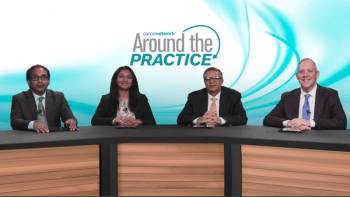
Panelists discuss a clinical scenario involving a 56-year-old male man with myeloma and del 17p deletion, treated with RVD induction, auto transplant, and lenalidomide maintenance, who relapsed after 2 years and is now referred to discuss chimeric antigen receptor (CAR) CAR-T versus vs standard therapy, sharing key takeaways and pearls from the case.

Panelists discuss successful collaborations between academic centers and community practices in the context of (chimeric antigen receptor (CAR) T-cell therapy for multiple myeloma, key lessons learned in integrating CAR T therapy into the treatment landscape, and future plans for expanding CAR T therapy’s role in earlier lines of multiple myeloma treatment.

Panelists discuss their institution’s approach to co-management and co-monitoring of (chimeric antigen receptor (CAR) -T patients, strategies to facilitate seamless transitions of care between academic centers and community practices, common challenges in the CAR -T referral process and solutions, and advice for community physicians on the timing and preparation for patient referrals.

Panelists explain how CAR-T cell therapy works and describe the treatment process, discussing whether CAR -T is considered a complex procedure at their institution or if the logistics have been streamlined into clinical workflows, and they also detail their institution's approach to bridging therapy for patients awaiting CAR-T manufacturing and infusion, including whether patients are managed in-house or sent back to community centers.

Panelists discuss which patients are considered for CAR-T therapy in second-line treatment for relapsed/refractory multiple myeloma (R/R MM) (cilta-cel vs ide-cel), describe the specific criteria and institutional guidelines used to determine patient eligibility, and explore how non-medical factors like such as location and financial considerations impact patient selection, while also outlining the typical CAR-T referral process from community physician outreach to patient evaluation and selection.

Panelists discuss the key factors that influence their institution's decision to utilize CAR-T therapy in earlier lines of treatment for relapsed/refractory multiple myeloma and explain the next steps they would take if choosing CAR-T, including the rationale behind their decisions.

Panelists discuss the data surrounding the use of CAR-T therapy in earlier lines of treatment for relapsed/refractory multiple myeloma (R/R MM), including findings from the cilta-cel (Popat R, et al. ASH 2024 No. 1032; Mateos MV, et al. IMS 2024 No. OA-65), and Idel-cel (Ailawadhi S, et al. Blood 2024) studies, and share their thoughts on the implications of these results.
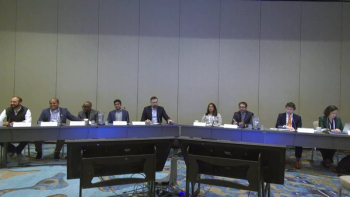
Final remarks and presentation of awards.

Experts discuss the Phase 2 D-ALBA trial results examining combination of dasatinib plus blinatumomab as frontline therapy for adults with Philadelphia chromosome-positive B cell acute lymphoblastic leukemia.

Experts provide extended follow-up on efficacy and safety outcomes with initial therapy combining ponatinib and hyperfractionated cyclophosphamide, vincristine, doxorubicin, and dexamethasone (hyper-CVAD) in patients with newly diagnosed Philadelphia chromosome-positive acute lymphoblastic leukemia.

Experts present findings on blinatumomab consolidation therapy from the Phase 3 ECOG-ACRIN E1910 trial in adult patients with newly diagnosed B-lineage acute lymphoblastic leukemia who achieved measurable residual disease-negative remission.

Experts provide the first report of results from the Phase 3 PhALLCON trial comparing initial therapy with ponatinib versus imatinib in patients with newly diagnosed Philadelphia chromosome-positive acute lymphoblastic leukemia.

Elranatamab in Relapsed or Refractory Multiple Myeloma: Phase 2 MagnetisMM-3 Trial Results
ByMuhamed Baljevic, MD, FACP,Bhagirathbhai Dholaria, MD,Adetola Kassim, MD, MS, FACP,Nisha Joseph, MD,Ajay Nooka, MD, MPH Examine the efficacy and safety of the BCMA-targeting bispecific antibody elranatamab as monotherapy and in combinations from the Phase 2 MagnetisMM-3 trial in patients with relapsed or refractory multiple myeloma.

First Results From the RedirecTT-1 Study With Teclistamab + Talquestamab Simultaneously Targeting BCMA and GPRC5D in Patients With Relapsed/Refractory Multiple Myeloma
ByMuhamed Baljevic, MD, FACP,Bhagirathbhai Dholaria, MD,Adetola Kassim, MD, MS, FACP,Nisha Joseph, MD,Ajay Nooka, MD, MPH Present initial results from the Phase 1 RedirecTT-1 trial exploring the combination of teclistamab and talquetamab in relapsed/refractory multiple myeloma.

Ide-cel or Standard Regimens in Relapsed and Refractory Multiple Myeloma
ByMuhamed Baljevic, MD, FACP,Bhagirathbhai Dholaria, MD,Adetola Kassim, MD, MS, FACP,Nisha Joseph, MD,Ajay Nooka, MD, MPH Compare outcomes between ide-cel chimeric antigen receptor T-cell (CAR-T) therapy and standard treatment regimens such as pomalidomide and daratumumab combinations in patients with heavily pretreated relapsed and refractory multiple myeloma.

Real-World Effectiveness of Ixazomib Combined With Lenalidomide and Dexamethasone in Relapsed/Refractory Multiple Myeloma
ByMuhamed Baljevic, MD, FACP,Bhagirathbhai Dholaria, MD,Adetola Kassim, MD, MS, FACP,Nisha Joseph, MD,Ajay Nooka, MD, MPH Present real-world data on the efficacy and safety of the ixazomib-lenalidomide-dexamethasone combination in patients with relapsed/refractory multiple myeloma outside of clinical trials.

Outcomes After Biochemical or Clinical Progression in Patients With Multiple Myeloma
ByMuhamed Baljevic, MD, FACP,Bhagirathbhai Dholaria, MD,Adetola Kassim, MD, MS, FACP,Nisha Joseph, MD,Ajay Nooka, MD, MPH Examine outcomes such as overall survival, progression-free survival, and response rates in multiple myeloma patients who have experienced biochemical or clinical progression after prior lines of therapy.

Cancer Network Face-Off: Introduction of Relapsed/Refractory Multiple Myeloma
ByMuhamed Baljevic, MD, FACP,Bhagirathbhai Dholaria, MD,Adetola Kassim, MD, MS, FACP,Nisha Joseph, MD,Ajay Nooka, MD, MPH A summary of key discussion points and an overview of the evidence presented to inform the dialogue.
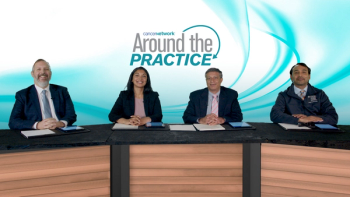
Subject matter experts share strategies for determining treatment selection and duration for patients with transplant-ineligible NDMM.

Subject matter experts share strategies for determining treatment selection and duration for patients with transplant-ineligible NDMM.

Ajay Nooka, MD, MPH, FACP leads a survey of the MAIA study, including a sub-group analysis of the MAIA study in frail patients, as well as findings from the MagnetisMM-6 study.














